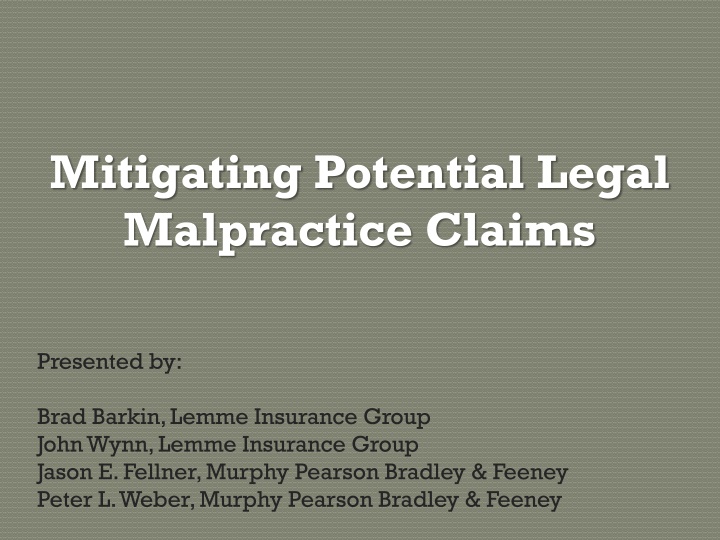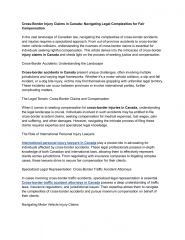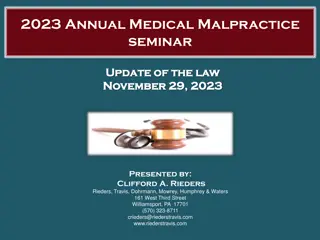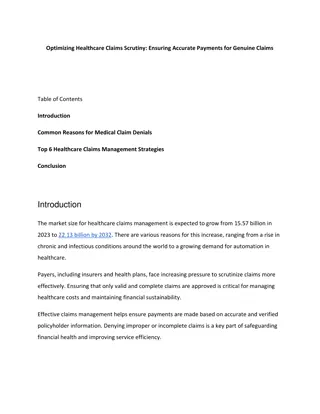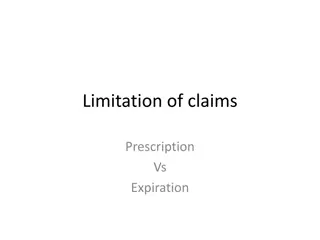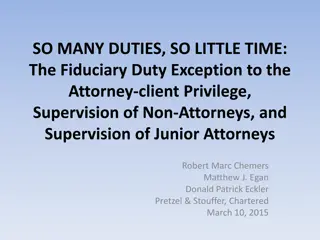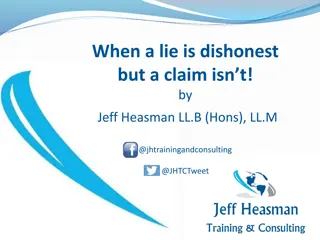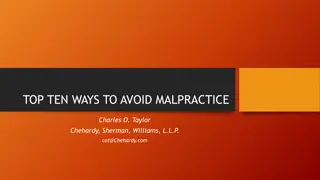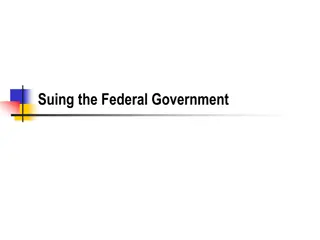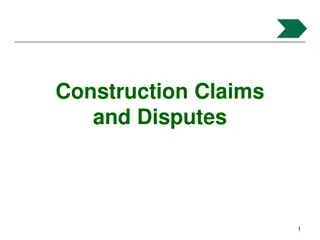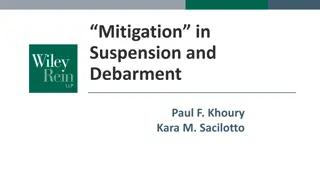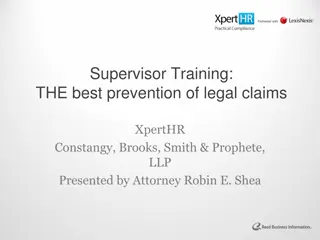Mitigating Potential Legal Malpractice Claims: Strategies and Considerations
This content discusses strategies to mitigate potential legal malpractice claims, including the importance of detailed written engagement agreements, fee agreements, scope of legal services, duties to non-clients, conflicts of interest, and statutory requirements. It emphasizes the significance of clear communication, setting client expectations, and adhering to ethical and professional standards to avoid malpractice risks. The content also covers the key elements of fee agreements, contingent fee agreements, and noncontingent fee agreements to ensure enforceability and protect both attorneys and clients.
Download Presentation

Please find below an Image/Link to download the presentation.
The content on the website is provided AS IS for your information and personal use only. It may not be sold, licensed, or shared on other websites without obtaining consent from the author.If you encounter any issues during the download, it is possible that the publisher has removed the file from their server.
You are allowed to download the files provided on this website for personal or commercial use, subject to the condition that they are used lawfully. All files are the property of their respective owners.
The content on the website is provided AS IS for your information and personal use only. It may not be sold, licensed, or shared on other websites without obtaining consent from the author.
E N D
Presentation Transcript
Mitigating Potential Legal Malpractice Claims Presented by: Brad Barkin, Lemme Insurance Group John Wynn, Lemme Insurance Group Jason E. Fellner, Murphy Pearson Bradley & Feeney Peter L. Weber, Murphy Pearson Bradley & Feeney
Opening the file Fee Agreements Scope and Expectations Duties to Non-Clients Statutory Requirements Conflicts of Interest Closing the file Client Files Discharge of the Attorney 2
a. Avoiding Malpractice through Detailed Written Engagement Agreement b. Reasonably restricting the scope of legal services by contract is permissible (Janik v. Rudy, Exelrod & Zieff (2004) 199 Cal.App. 4th 930, 940.) c. Legal Services Agreement Should Set forth clear Scope of Representation d. Money deposited as a Retainer must be placed in client trust account. (Cal. Rules of Prof. Conduct, Rule 4-100.) 3
Fee Agreements are Contracts: As a general rule, attorney and client may agree to the measure and mode of an attorney s compensation (C.C.P. Section 1021.) Basic principles of contract law apply and any ambiguity is resolved in favor of the client. Set Scope and Client Expectations: Reasonably restricting the scope of legal services by contract is permissible (Janik v. Rudy, Exelrod & Zieff, (2004) 119 Cal.App.4th 930, 940.) Fee Agreements establish a date certain for the commencement of the attorney-client relationship, which set forth the terms and scope of the relationship. Pursuant to Bus. & Prof. Code Section 6148(a)(2), a written fee agreement must contain the general nature of the legal services provided. In legal malpractice cases, one of the most important documents is the fee agreement because it identifies the client, date that relationship began, and scope of work agreed to perform. 4
Contingent Fee Agreement Bus. & Prof. Code Section 6147 sets forth requirements for Contingent Fee Agreements. Contingent Fee Agreements must be in writing to be enforceable, except those for recovery of worker s compensation benefits or certain merchant s claims. The contingent fee agreement must specify: the fee agreed on; how the costs of prosecuting the case will affect the fee and the client s recovery; and a statement that the fee is negotiable. Irrespective of Fee Agreement, good practice dictates to identify hourly rate of attorney in legal services agreement to specify reasonable value of services. Noncontingent Fee Agreement Bus. & Prof. Code Section 6148 sets forth requirements for Noncontingent Fee Agreements. Noncontingent Fee Agreements must provide the following in order to be enforceable: the basis of compensation, including hourly rates, statutory fees, or flat fees; and other standard rates, including costs. GOOD PRACTICE: Always have a signed fee agreement before you begin work! Having a fee agreement limits potential for disagreement and strengthens attorney s position if and when a fee dispute arises. Absent a fee agreement, an attorney is only entitled to quantum meruit as compared to the full value of the contract. Statute of Limitations: A written agreement is subject to a 4 year statute of limitations (C.C.P. Section 337) compared with an oral agreement subject to a 2 year statute of limitations (C.C.P. Section 339). 5
GOOD PRACTICES: Attorney and Client should both sign agreement. It s a mistake to simply send letter memorializing agreement and/or have the client sign letter accepting terms of legal service. If the scope of representation changes after execution of the fee agreement, counsel should amend the agreement to clarify the revised scope of services. An attorney s standard of care is oftentimes defined by the scope of work that he/she agreed to perform for a client. As a result, the scope of work detailed in the legal services agreement is a critical part in utilizing the fee agreement as a way to minimize malpractice exposure. 6
Identify your client When representing a minor or disabled person, the attorney client fee agreement should be entered into between the attorney and the guardian ad litem or conservator. (See Fam. Code Section 6710; Prob. Code Section 3603.) Clients frequently ask other individuals to accompany them when consulting with a lawyer. Unless you clearly identify who your client is in a fee agreement, you run the risk that an implied-in-fact relationship will be found to exist (and all duties owed) to persons you may not intend to be clients. (Hecht v. Sup. Ct. (1987) 192 Cal.App.3d 560.) If a third party is paying the fees for your client, make sure that it is clear who your client is in your fee agreement. 7
Duty to check for Potential Conflicts before accepting representation: Attorney should check for any potential conflicts with those who are adverse and potentially adverse, including reasonably foreseeable parties and witnesses, before accepting representation of a client in any matter. (Cal. State Bar Form Opn. 2011-182.) GOOD PRACTICE: Run and maintain a conflict check system that contains a database of former and current clients. A conflict check should be created and be part of the client intake process. A file should not be opened until a conflict check is cleared and a legal services agreement is fully executed. 8
Rule 3-300 Avoiding Interests Adverse to a Client A member shall not enter into a business transaction with a client; or knowingly acquire an ownership, possessory, security, or other pecuniary interest adverse to a client, unless each of the following requirements has been satisfied: (A) The transaction or acquisition and its terms are fair and reasonable to the client and are fully disclosed and transmitted in writing to the client in a manner which should reasonably have been understood by the client; and (B) The client is advised in writing that the client may seek the advice of an independent lawyer of the client's choice and is given a reasonable opportunity to seek that advice; and (C) The client thereafter consents in writing to the terms of the transaction or the terms of the acquisition. 9
Rule 3-310 Avoiding the Representation of Adverse Interests (C) A member shall not, without the informed written consent of each client: (1) Accept representation of more than one client in a matter in which the interests of the clients potentially conflict; or (2) Accept or continue representation of more than one client in a matter in which the interests of the clients actually conflict; or (3) Represent a client in a matter and at the same time in a separate matter accept as a client a person or entity whose interest in the first matter is adverse to the client in the first matter. 10
"Informed written consent" means the client's or former client's written agreement to the representation following written disclosure. Examples 11
Client has absolute power to discharge attorney at any time with or without cause. (Fracasse v. Brent (1972) 6 Cal.3d 784, 790.) Discharged attorney is entitled to recover reasonable value of services rendered to the time of discharge. (Id.) Attorney may withdraw at any time as permitted under the Rules of Professional Conduct, which include: (a) client consents; (b) client s conduct makes it unreasonably difficult for attorney to carry out the employment effectively, and (c) client fails to pay attorney fees or costs as required by the legal services agreement. (Cal. Rule of Professional Conduct, Rule 3-700.) GOOD PRACTICE: Send closing letter with final bill to begin clock on any legal malpractice action. The time for filing a legal malpractice action is one-year from the date that the plaintiff knew or should have discovered the malpractice. The statute is tolled for continued representation. (See C.C.P. Section 340.6.) 12
Attorney is ethically obligated on termination of employment and at client s request to promptly release client file. (Cal. Rule of Professional Conduct, Rule 3-700.) Unless the attorney-client relationship is terminated, a lawyer is required to carry through to conclusion all matters undertaken for a client. The duration of the attorney-client relationship depends upon the agreed upon scope of the relationship. (Matter of Allen (Rev.Dept. 2010) 5 Cal. State Bar Ct.Rptr. 198, 204.) 13
The first rule of business is to survive and the guiding principle of business economics is not the maximization of profit, it is the avoidance of loss. Peter Drucker What are our risk management strategies: Avoid Just Don t Do It Reduce Reduce the chance of it happening or the harm caused Share Buy Insurance Retain We ll Take Care of It 14
Buying Your Insurance Policy Lack of insurance coverage for a significant claim can threaten the existence of a law firm. The majority of Lawyers Professional Liability ( LPL ) insurers have noted an increase in both frequency and severity of claims between 2009 and 2012. LPL Underwriters acknowledge that there are several claims in the market that will cost in excess of $50mln. The cost of defending claims continues to rise with several LPL claims exceeding $20mln in defense cost alone. 15
Most lawyers professional liability policies are claims-made and reported policies. Claims covered only if the act, error or omission occurred during the policy period AND is reported to the insurer during the policy period. Modern policies extend coverage to claims that occurred prior to the policy period so long as no insured had knowledge of facts that could support a claim as of the effective date of the policy. Most policies have Discovery Clause to lock-in coverage for a Potential Claim Avoid harsh nature of claims made and reported insurance policy by knowing and understanding your policy 16
Two of the most common ways insurers deny professional liability insurance coverage are: 1. Prior Knowledge limitation clause 2. Failure to properly notify a claim The Policy will show you the way Understand terminology Understand intent of coverage Implement policies and procedures to ensure coverage of Claims and Potential Claims 17
Prior Knowledge Limitation The most used provision by insurers to deny coverage for a claim and perhaps one of the least understood provisions by the law firm insured. The provision is in place to deny coverage for a given claim, if, prior to the policy s inception date or defined retroactive date, a member of the law firm had actual knowledge of facts or circumstances which a reasonable lawyer could foresee might result in a claim. 18
Positive grant of coverage provided that, no Insured had a basis to believe that any such act or omission, or Related Act or Omission, might reasonably be expected to be the basis of a Claim 20
Claim / Incident / Disciplinary Information 35. After inquiry, is any attorney in the firm aware of: b. an actual or alleged act, omission, circumstance, or breach of duty that a reasonable attorney would recognize might reasonably be expected to result in a claim being made against the firm, any predecessor firm, or against any attorney currently or formerly affiliated with the firm or any predecessor firm, regardless of whether any such claim would be meritorious? Yes No If yes to a, or b above complete a Claims/Disciplinary Supplemental Application for each claim or incident. 21
Signature and Representation 3. Applicant s failure to report to its current insurance company, during the current policy period, either any claim made against any insured, or any act or omission known to any insured that may reasonably be expected to be the basis of a claim against any insured may create a lack of coverage. 4. Any attorney currently or formerly affiliated with the firm or any predecessor firm, has disclosed in this Application any actual or alleged, act, omission, circumstance or breach of duty that a reasonable attorney would recognize might reasonably be expected to result in a claim being made against the firm, any predecessor firm, or any attorney currently or formerly affiliated with the firm or any predecessor firm, regardless of whether any such claim would be meritorious 22
When analyzing apply both subjective/objective standard: whether an insured had actual knowledge of certain facts upon which a reasonable attorney would have the basis to believe that the insured breached a professional duty and that a claim might reasonably be made based on those facts: It is irrelevant whether a lawyer believed that the claim lacked merit or was frivolous. It does not make a difference if the lawyer did not report the matter because he subjectively believed that due to his excellent client relationship he didn t think a claim would be made. 23
Abood v. Gulf Group Lloyds, 2008, WL 2641310 Plaintiff firm, ARPR, represented a woman in her claim to recover damages for personal injuries arising out of an automobile accident which took place on Feb. 19, 2001. Statute of limitations on woman s claim expired on Feb. 19, 2003. Due to difficulties demonstrating woman s injuries, ARPR failed to file complaint before statute of limitation expired. Feb. 26, 2003. ARPR informed woman of their failure to timely file and advised her to pursue other counsel. In woman s response, she informed ARPR that she would not sue for malpractice b/c she was still able to pursue her underinsured motorist claim. 24
In 2004 ARPR purchased a claims-made LPL policy for the period Jun 17, 2004 to June 17, 2005, which excluded coverage for any claim related to a negligent act occurring prior to the inception date of the policy if the insured knew or could have reasonably foreseen it would be the basis of a claim. On June 8, 2005 new lawyers representing woman injured in 2001 notified ARPR of their intent to file a malpractice claim. ARPR advised Insurer of claim in June 10, 2005 letter. In response Insurer denied coverage b/c ARPR neglected to inform Insurer of this potential claim before signing the application despite it being a reasonably foreseeable claim. 25
In July 2005, ARPR filed declaratory judgment claiming Insurer owed them indemnification b/c they had no knowledge prior to signing the application that they would be sued. Court held that prior knowledge exclusion barred coverage notwithstanding the underlying plaintiff s initial indication that she did not intend to file suit. Court concluded that a reasonable attorney in plaintiffs position would have known that malpractice claim was possible. Court found that any actions by client/claimant that fall short of a waiver of future claims against an attorney will not extinguish prior knowledge exception. Court also ruled that an attorney s subjective belief, on the basis of his relationship with his client or his impression of a client s reaction to a situation, have no bearing on a prior knowledge exception. 26
As LPL policies are written on a claims-made basis and include a prior knowledge provision, a failure to report a claim or potential claim under current policy can cause a law firm to lose coverage. It is essential that all claims or potential claims are reported pursuant to the requirements of the policy. If an error has occurred, report the matter as a potential claim, even if your client has indicated it does not plan to sue. Promote a culture where it is encouraged to discuss possible client issues. Adopt a formal policy for the discovery and reporting of claims. Train staff and attorneys on the reporting requirements of the LPL policy. Appoint a central point person (managing partner, risk management partner, etc.) to review all potential claims. 27
Coverage disputes due to a failure to provide timely notice of claims or potential claims are common Timely notice of a claim to the insurer during the policy period is a condition precedent to coverage In addition to requiring that the claim be Reported during the same policy period in which claims was made, most policies require notice be made within a specified time period after learning of the claim, which can be good or bad. Potential Claim notice provisions are double edged sword providing relief from prior knowledge limitation, but requiring notice during the policy period regardless of the Claim notice provision. It is critical for law firms to understand the reporting requirements of the insurance contract because notice provisions are strictly construed. 28
I. INSURING AGREEMENT A. Coverage The Company agrees to pay on behalf of the Insured all sums in excess of the deductible that the Insured shall become legally obligated to pay as damages and claim expenses because of a claim that is both first made against the Insured and reported in writing to the Company during the policy period by reason of an act or omission in the performance of legal services by the Insured or by any person for whom the Insured is legally liable 29
1. Notice of Claims The Insured, as a condition precedent to the obligations of the Company under this Policy, shall as soon as reasonably possible after learning of a claim give written notice to the Company during the policy period of such claim. The Company agrees that the Insured may have up to, but not to exceed, sixty (60) days after the Policy expiration to report a claim made against the Insured during the policy period if the reporting of such claim is as soon as reasonably possible. 30
Notice provisions vary, depending on the policy, requiring that notice be given: immediately (particularly upon receipt of demand letters, legal pleadings and other written information relative to Claim) no later than a specified period of time after becoming aware; or, as soon as reasonably possible As soon as reasonably possible a prejudicially long delay could jeopardize coverage Notice must be in a manner such that it is clear to the insurer that a claim is being reported 31
Potential Claim It is not a Claim YET! demand for money or services arising out of an act or omission in the rendering of legal advice Act, error or omission that could reasonably become a claim in the future Objective review Facts indicating act, error or omission, available at the time Which reasonable attorney believes may reasonably be expected to be the basis of a claim against the Insured Provisions require the insured to identify particular clients, and particular errors or omissions. 32
2. Notice of Potential Claims If during the policy period the Insured becomes aware of any act or omission that may reasonably be expected to be the basis of a claim against the Insured and gives written notice to the Company of such act or omission and the reasons for anticipating a claim, with full particulars, including but not limited to: a. the specific act or omission; b. the dates and persons involved; c. the identity of anticipated or possible claimants; d. the circumstances by which the Insured first became aware of the possible claim, then any such claim that arises out of such reported act or omission and that is subsequently made against the Insured and reported to the Company shall be deemed to have been made at the time such written notice was given to the Company. 33
Relying on renewal application to provide notice: LPL policies provide specific instructions on how to give notice to insurers of claims or potential claims. Simply including details of a claim or potential claim in a renewal application does not meet the standard required by the policy. Relying on insurance broker to provide notice: While some insurers will accept notice of a claim or potential claim from an insured s insurance broker, not all will. In one decision, trial court rejected idea that insured's notice to broker was sufficient stating, An insurance broker is the agent of the insured, not the insurance company, and notice to an insurance broker is not notice to the insurer Oral notice may not be sufficient: Oral notice to your insurer about a claim or potential claim may not suffice reconfirming the importance of understanding your specific policy requirements. Laundry list of list of clients and matters as notice of Potential Claim Provisions require that the insured identify particular clients, and particular errors or omissions. A letter to insurer merely expressing concern about potential claim would not trigger coverage if it did not identify circumstances as to why the insured had a reasonable basis to foresee a claim. Timing of Notice of Potential Claim is different than a Claim Notice of Potential Claim is during the policy period 34
Berry & Murphy, P.C. v Carolina Casualty Insurance Company, 586 F.3d 803 Tenth Circuit held that there was no coverage under an LPL policy where the claim was first made against a former partner of an insured firm after he left the firm, and he did not immediately disclose this to his prior firm. Background: Berry & Murphy, P.C. ( B&M ) undertook a personal injury client, the Burkhardts, in January 2005 with Mr. Murphy in the role as lead lawyer. In March 2006, Mr. Murphy left B&M and joined another firm, taking personal injury suit with him. Soon after his departure, he filed motioned to withdraw from Burckhardt's lawsuit, which district court granted. Burckhardt's claim was dismissed without prejudice for failure to prosecute in June, 2006. Burkhardts hired new counsel and case was reinstated but again dismissed for failure to provide discovery. Burkhardts new attorney sent Mr. Murphy a letter suggesting a forthcoming claim for mishandling of the case and demanding he provide notice to his carrier. Mr. Murphy did send notice to the carrier for his new firm but did not provide a copy to B&M. 35
January 2008, Burkhardts filed legal malpractice claim against Murphy and his former firm, B&M. In July 2008, Murphy s former partner Berry accepted service of complaint on behalf of B&M and gave notice to Carolina Casualty. Mr. Berry had a claims-made and reported policy effective Feb. 6, 2008 to Feb. 6, 2009. Carolina Casualty denied coverage on grounds that alleged malpractice was first made against an insured (Murphy) prior to the inception date of the policy, therefore falling outside the policy coverage. In ensuing coverage dispute, Berry argued that b/c policy was effective when he notified carrier in July 2008, the carrier improperly denied coverage. 36
District court disagreed and entered summary judgment for Carolina Casualty reasoning Murphy, an insured, had notice of the claim and the fact he failed to notify his former co-shareholder was not a burden that should fall on carrier. Tenth Circuit affirmed. Court assumed that B&M was a predecessor firm to Berry s firm and that Murphy was an insured under the terms of the policy, rejecting Berry s argument that Murphy ceased being an insured when he left the firm. Court, determining that the wrongful acts alleged in Burkhardts January 2007 letter related to the acts alleged in malpractice claim and that Murphy was an insured, concluded that the claim was not first made against the insured and reported during the same policy period and there was no coverage. 37
Imperative that law firms report notice of claims and potential claims to their LPL insurer immediately upon becoming aware of the matter. Critical to review, and modify if necessary, the knowledge of claim provision in the policy. Some insurers will agree to modify language that limits the knowledge of a possible claim to a small group of partners such as Managing Partner or General Counsel. Assign responsibility for claim discovery, handling and reporting to an individual or committee with requisite knowledge and experience to oversee the process. Train attorneys and staff on firm policy and insurance requirements regarding discover and reporting of Claims and Potential Claims Law firms should adopt policies and procedures that require outgoing lawyers to acknowledge ongoing responsibility to provide notice of any claim or potential claim that they become aware of after their departure from the Firm. 38
LPL claims can: have significant financial impact (exhaustion of retention, increase in premium at renewal, etc.) become time consuming damage a firm s reputation and morale The negative implications of claims are dramatically compounded if a claim is denied for prior knowledge or improper notice of a claim. In situations where an insurer can legitimately deny coverage, the financial consequences can threaten the existence of a law firm. 39
Mitigating Potential Legal Malpractice Claims Presented by: Brad Barkin, Lemme Insurance Group John Wynn, Lemme Insurance Group Jason E. Fellner, Murphy Pearson Bradley & Feeney Peter L. Weber, Murphy Pearson Bradley & Feeney
